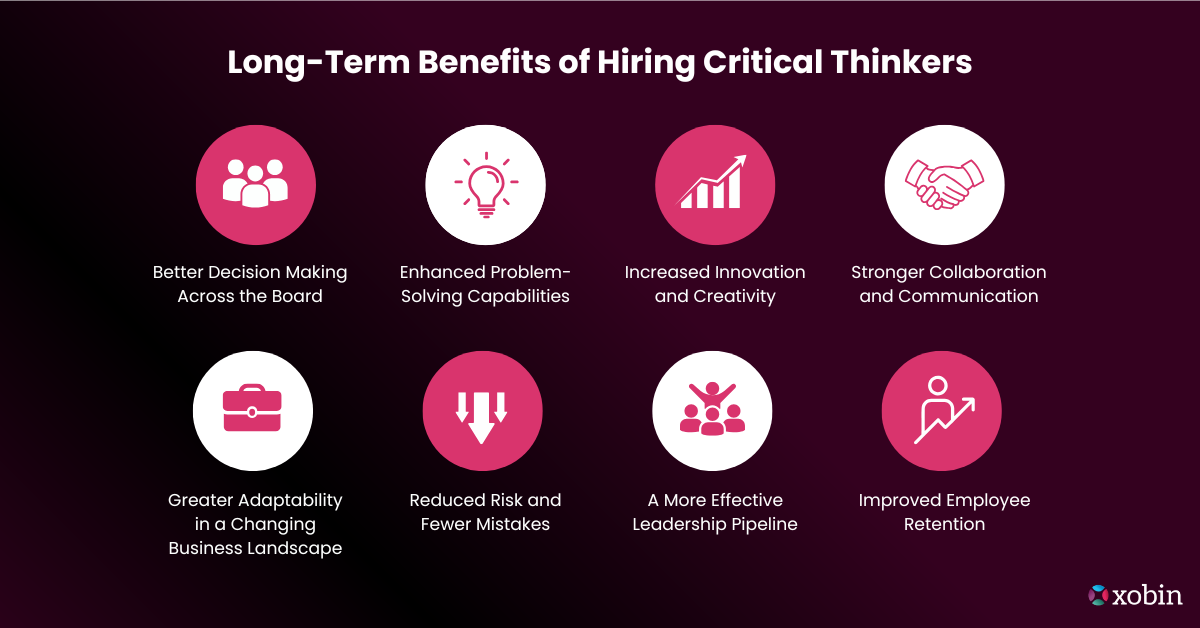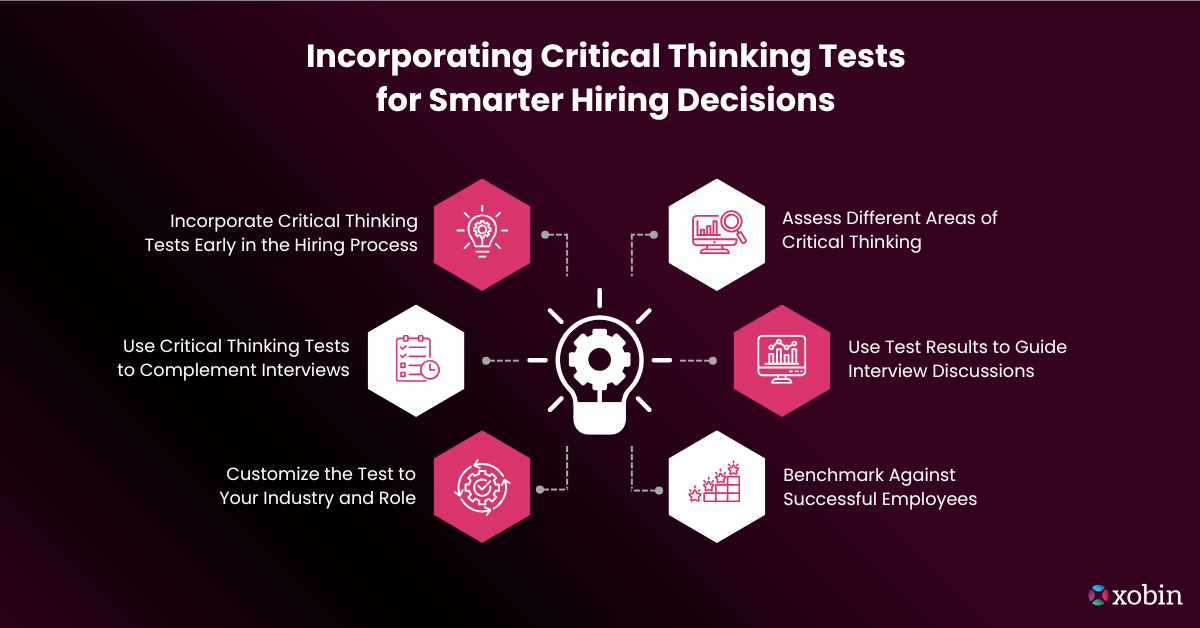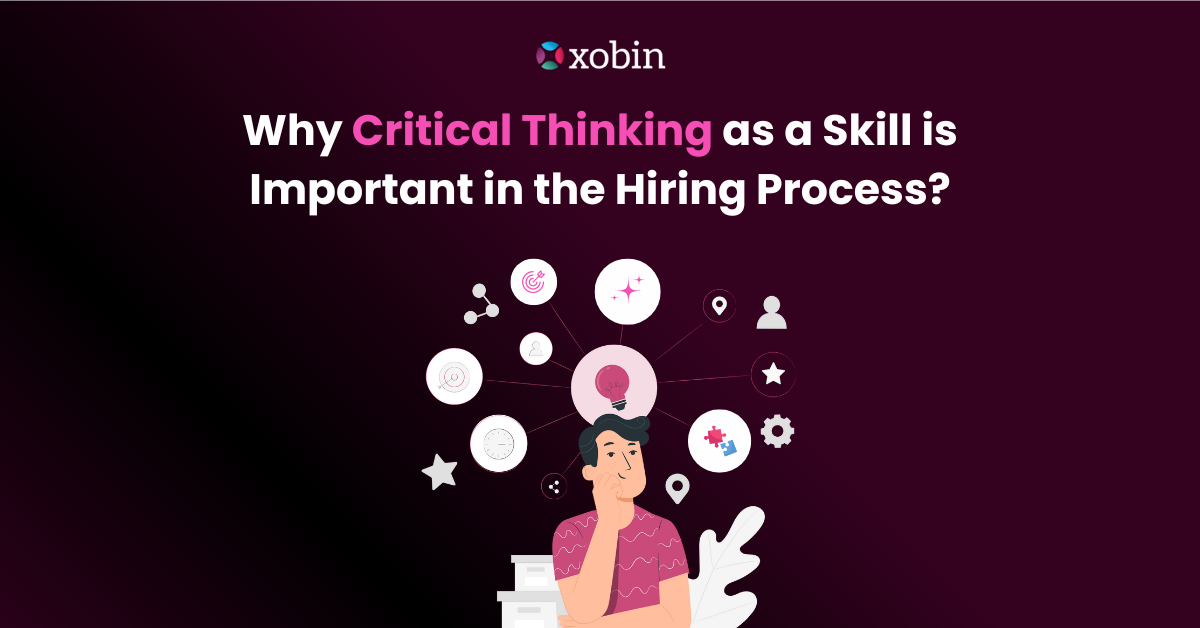In a fast-paced and ever-evolving work environment, hiring managers and recruiters face a significant challenge – finding candidates who not only have the right technical skills but also possess the ability to think critically. Critical thinking is an essential skill that goes beyond solving problems. It involves analyzing situations, making decisions based on logic and reasoning, and adapting quickly to new challenges. But why is critical thinking so important in the hiring process? With Xobin’s Pre-Employment Testing, companies can assess a candidate’s problem-solving ability, ensuring they hire individuals who can think analytically and make informed decisions.
Table of Contents
Critical Thinking Meaning
Critical thinking involves the ability to evaluate information, consider different perspectives, and make reasoned decisions. It’s about being able to look at a problem or situation, break it down into smaller parts, analyze each part, and come up with solutions that make sense. Critical thinkers ask critical reasoning questions, challenge assumptions, and evaluate the evidence before making decisions.
Why does it matter in recruitment? Because the modern workplace is full of complexity, ambiguity, and change. Employees need to be able to adapt to new information, make informed decisions quickly, and navigate through uncertain situations. Candidates who exhibit strong critical thinking skills can contribute to problem-solving, innovation, and overall team success.
Critical thought isn’t just for the intellectuals. It’s for anyone who needs to navigate the unpredictable nature of work. Whether it’s dealing with a customer issue, collaborating on a team project, or developing a new strategy, critical thinking is the backbone of effective decision-making.
- The ability to think outside the box
- Resilience in facing challenges
- A structured approach to solving problems
If you’ve ever looked at a problem from different angles or thought, “What could I be missing here?”, you’ve engaged in critical thinking. It’s about digging deeper to uncover the best possible solution.
Importance of Critical Thinking as a Skill
Complex Problems Solving
Imagine you’re facing a sudden challenge at work, something that wasn’t on the agenda. A candidate with strong critical thinking skills will not panic. Instead, they’ll break the problem into smaller, manageable parts, weigh the pros and cons, and come up with a solution quickly and efficiently. This approach doesn’t just help in the moment—it improves long-term decision-making as well.
Critical thinking enables candidates to not just solve problems, but to solve them well. It ensures that they approach each issue from various angles, ultimately leading to better outcomes for the company.
Boosts Creativity and Innovation
You might think that critical thinking and creativity don’t go hand in hand, but in reality, they complement each other perfectly. Critical thinking pushes candidates to step outside their usual patterns of thinking, explore new possibilities, and assess potential risks with a logical framework. This opens up room for innovative ideas, making the candidate a valuable asset when the company needs fresh approaches to old problems.
Without critical thinking, a candidate may struggle to navigate new challenges or resist change. But with this skill, they’re empowered to look at situations from a new perspective and find solutions that others might overlook.
Better Decision-Making
Every organization thrives on good decision-making. A candidate who can think critically can sift through data, separate fact from fiction, and make well-informed choices. This skill is especially useful when dealing with complex problems where there’s no clear-cut solution. Critical thinkers are less likely to jump to conclusions based on gut feelings. They examine all available information and consider the possible outcomes of each option before acting.
This leads to more confident decisions, which benefit both the individual and the company they work for. The more well-rounded the decision-making process, the better the long-term success for the business.
Promotes Clear Communication
Critical thinking isn’t just about analyzing problems and making decisions—it’s also about communicating those decisions clearly. When candidates possess critical thinking skills, they’re able to explain their thought process in a concise, coherent manner. This helps others understand the reasoning behind decisions, fosters collaboration, and ensures transparency within the team.
Moreover, candidates with critical thinking abilities can spot flaws or inconsistencies in arguments, which helps them engage in meaningful discussions, leading to better team dynamics and more effective brainstorming sessions.
Helps to Navigate Ethical Dilemmas
In the workplace, ethical dilemmas are inevitable. A candidate with critical thinking skills can assess such situations with a clear mind, weighing potential outcomes and the moral implications of their actions. By doing so, they help foster a culture of integrity and accountability within the organization. The ability to make ethically sound decisions can be a game-changer for any business, as it helps in maintaining a positive reputation and building trust with stakeholders.
Adaptability in a Changing Environment
In today’s fast-paced world, things change in the blink of an eye. New technology, market trends, or even global events can disrupt a business overnight. Candidates with critical thinking skills are better equipped to adapt to these shifts. They don’t just go with the flow—they analyze the situation, assess the risks and opportunities, and pivot accordingly.
Being able to think critically allows candidates to adjust their strategies, learn new skills quickly, and embrace change, all while remaining focused on their goals.
Promotes Self-Reflection and Continuous Improvement
Critical thinking also encourages a culture of self-reflection. Candidates who are critical thinkers tend to question their own assumptions and beliefs, which leads to continuous improvement. They don’t just settle for “good enough” but constantly look for ways to enhance their performance, learn from mistakes, and apply those lessons moving forward. This growth mindset makes candidates more adaptable and eager to develop new skills, making them more valuable as they progress within an organization.
How Critical Thinking Fits into Recruitment?
Now that we understand the importance of critical thinking, let’s discuss how critical thinking plays a crucial role in recruitment. Identifying candidates who possess this skill requires a thoughtful approach to recruitment. Simply put, traditional interviews and resume evaluations won’t give you a full picture of a candidate’s critical thinking abilities. Here’s how to critical thinking fits into your hiring procedure:
1. Assessing Problem-Solving Abilities
To evaluate problem-solving abilities of candidates, you can use critical thinking tests or situational judgment tests. These tests assess how candidates approach complex problems and make decisions under pressure. For example, you might present a hypothetical scenario related to the job and ask candidates how they would handle the situation. Their response will reveal how they analyze the problem, consider different solutions, and justify their decisions.
You can use problem-solving skill test, which helps recruiters evaluate a candidate’s ability to think analytically, solve problems, and make informed decisions. This tool can streamline your recruitment process by helping you identify candidates who possess the right cognitive abilities for your company.
2. Behavioral Interview Questions
To evaluate critical thinking skills of candidates effectively, consider using behavioral interview questions. These questions prompt candidates to share specific examples from their past where they applied critical thinking to tackle challenges or make tough decisions. For instance, asking, “Can you describe a time when you had to make a difficult decision with limited information?” or “Tell me about a situation where you identified a problem and devised a solution” can reveal valuable insights into their thought process and problem-solving abilities.
Encouraging candidates to recount concrete experiences offers a clearer picture of how they utilize critical thinking in real-world scenarios. This approach not only evaluates their skills but also highlights their ability to navigate complex situations.
3. Assessing Cognitive Abilities with Online Assessments
Online assessments are a valuable tool for evaluating critical thinking skills before the interview stage. Xobin’s skill assessment platform offers a variety of pre-employment tests that assess a wide range of cognitive abilities, including critical thinking. These assessments can help you quickly determine whether a candidate possesses the skills necessary to succeed in your organization, saving you time and resources in the recruitment process.
4. Evaluating Cultural Fit and Adaptability
While technical skills are essential, a candidate’s ability to adapt to your company’s culture is also important. Critical thinkers often exhibit a high degree of adaptability and resilience, which can be valuable when integrating them into your team. During the interview process, assess how candidates respond to change and new challenges. Ask them about their experiences working in dynamic environments or navigating through uncertainty. Candidates who exhibit adaptability and resilience are likely to thrive in a fast-paced workplace.
Long-Term Benefits of Hiring Critical Thinkers

Beyond just decision-making, critical thinking plays a role in creating a more collaborative, creative, and effective team. So, how exactly can hiring for critical thinking change the trajectory of your company?
1. Better Decision Making Across the Board
When employees are trained to think critically, they don’t just go with the flow or follow the same old solutions. Instead, they look deeper into issues, weigh pros and cons, and explore various solutions before making decisions. This results in better outcomes, as employees are less likely to make impulsive or poorly thought-out choices.
Think about it: an employee who can critically assess a situation, predict possible consequences, and choose a solution with confidence is an asset to any company. With better decision-making at all levels of the organization, the company is more likely to thrive in both good times and challenging periods.
2. Enhanced Problem-Solving Capabilities
When you hire people who possess critical thinking skills, you’re hiring problem solvers. These individuals will not only identify problems quickly but also think creatively about how to solve them. They won’t just focus on the surface issue—they will dig deep to find the root cause and suggest effective, long-term solutions.
Organizations that prioritize critical thinking will notice that their teams are more proactive in addressing challenges. Instead of relying on trial and error or passing the buck, employees who excel at critical thinking are more self-sufficient and resourceful. This can lead to quicker resolutions and, in the long run, a more agile organization.
3. Increased Innovation and Creativity
A workforce that embraces critical thinking isn’t afraid to challenge the status quo. In fact, they thrive on it. These employees tend to be more innovative, suggesting fresh ideas and approaches to problems that others may not have considered. By hiring individuals who are encouraged to think critically, you foster a culture of innovation and creativity, which can give your organization a competitive edge.
Imagine the possibilities when employees are not afraid to speak up, think outside the box, and bring forward new solutions. Over time, this can lead to groundbreaking products, improved processes, and a stronger brand reputation for being a leader in innovation.
4. Stronger Collaboration and Communication
It might surprise you, but critical thinkers are often excellent collaborators. Why? Because they don’t just listen to respond—they actively listen to understand. Critical thinkers approach discussions with an open mind, ready to engage in thoughtful dialogue. This leads to more effective communication, where everyone’s ideas are valued and considered.
As collaboration becomes stronger within teams, it enhances the overall dynamic of the organization. Employees learn to respect diverse viewpoints, leading to better decision-making and more productive brainstorming sessions. Over time, this strengthens the organization’s internal culture and fosters stronger relationships both within and outside the company.
5. Greater Adaptability in a Changing Business Landscape
Businesses face constant changes—whether it’s new technologies, evolving markets, or shifts in consumer behavior. In this environment, adaptability is key. Employees who think critically are better equipped to handle change because they can quickly analyze the situation, understand the implications, and adjust their approach accordingly.
For example, a critical thinker might be more adept at pivoting to a new technology or adjusting to a sudden shift in market demands. With a team full of individuals who can handle change with ease, your organization will remain agile and better positioned to capitalize on new opportunities.
6. Reduced Risk and Fewer Mistakes
Every business faces risks. But when employees are trained to think critically, they are less likely to make costly mistakes. Critical thinkers are more thorough in their assessments and decision-making, reducing the likelihood of errors that could have long-term consequences for the company.
This also ties into risk management. By analyzing situations from every angle, critical thinkers are more likely to spot potential risks and come up with strategies to mitigate them. As a result, your organization can avoid expensive missteps and stay on track toward its goals.
7. A More Effective Leadership Pipeline
Critical thinking isn’t just beneficial for employees at the ground level—it’s also essential for leadership. In fact, hiring for critical thinking helps create a more effective leadership pipeline. When employees develop critical thinking skills, they’re better equipped to take on leadership roles in the future.
Leaders who think critically can make better decisions, manage their teams more effectively, and help guide the organization through both calm and turbulent times. This long-term impact strengthens the company as a whole, ensuring that leadership transitions are smooth and that the company continues to grow and evolve.
8. Improved Employee Retention
Employees who are encouraged to think critically often feel more engaged and fulfilled in their roles. They appreciate having the freedom to make decisions, solve problems, and contribute creatively to the organization’s success. This sense of autonomy and value leads to higher job satisfaction, which can, in turn, boost employee retention.
Over time, as employees grow and develop their critical thinking skills, they become more invested in the company’s success, which can reduce employee turnover. Organizations that prioritize hiring critical thinkers create a work environment where employees feel empowered and valued, leading to longer, more productive careers.
How to Incorporate Critical Thinking Tests for Smarter Hiring Decisions?

1. Using Critical Thinking Tests Early in the Hiring Process
To make sure that the candidates you’re considering have strong critical thinking skills, it’s essential to integrate critical thinking tests early on. Don’t wait until the final interview or assessment. Introducing these tests at the application or pre-screening stage will help you quickly weed out candidates who might not meet the mark.
This early evaluation can save you time and resources by narrowing down your talent pool to individuals who have the ability to analyze, reason, and problem-solve effectively.
2. Use Critical Thinking Tests to Complement Interviews
While interviews provide insight into a candidate’s personality and qualifications, they don’t always showcase their problem-solving abilities. A critical thinking test can fill in the gaps. By evaluating candidates on tasks that require logical reasoning, you’ll get a clearer picture of how they approach real-world challenges.
For example, during an interview, you can present a scenario that the candidate must solve on the spot, and use this as a conversation starter. Combining this with a well-structured test can ensure you’re not just getting surface-level responses but a deeper understanding of their cognitive abilities.
3. Customize the Test to Your Industry and Role
Not all jobs require the same level of critical thinking skills. For example, a software developer might need to solve complex technical problems, while a marketing manager might need to creatively approach customer engagement. Tailor the critical thinking test to match the specific requirements of the role you’re hiring for. For instance:
- Tech roles: Focus on problem-solving and logical analysis.
- Customer service: Test for adaptability and quick decision-making.
- Leadership positions: Assess their ability to think strategically and make high-level decisions.
This way, you can ensure the test is relevant to the challenges the role will present.
4. Assess Different Areas of Critical Thinking
Critical thinking isn’t just one skill—it’s a combination of various cognitive abilities. It’s essential to assess different areas like logical reasoning, problem-solving, decision-making, and creativity. A well-rounded critical thinking test will cover a broad range of scenarios, helping you assess candidates on all fronts.
Here are some areas to consider:
- Deductive reasoning: Ability to make conclusions based on available evidence.
- Inductive reasoning: Drawing generalizations on the basis of patterns and observations.
- Problem-solving: Ability to find solutions when faced with challenges.
- Creative thinking: Ability to think outside of the box and come up with innovative solutions.
By evaluating candidates across multiple dimensions, you’ll be able to identify individuals who bring a variety of strengths to the table.
5. Use Test Results to Guide Interview Discussions
The results from the critical thinking test should not be treated as standalone data. Use them to drive your interview discussions. If a candidate excels in a specific area of critical thinking, delve deeper into that topic during the interview. On the flip side, if they scored lower in a certain area, ask them about it—maybe they have a solid explanation for it.
Think of the test as a conversation starter. Instead of just ticking off boxes based on qualifications, this will lead to a deeper dive into the candidate’s thought process and how they arrive at solutions.
6. Benchmark Against Successful Employees
Do you already have high-performing employees in similar roles? Why not benchmark their critical thinking abilities against your candidates? If you know the types of critical thinking traits that lead to success in your organization, you can tailor your test to evaluate candidates with the same mindset. This is a great way to create consistency and find individuals who are likely to thrive in your company culture.
Cutting Down Bad Hires with Xobin’s Critical Thinking Assessment
Bad hires are costly—investing in a reliable assessment tool like Xobin’s Critical Thinking Assessment can save you money and reduce turnover. When you use our Critical Thinking Assessment, you gain a deeper understanding of a candidate’s thought processes and approach to problem-solving. This helps you avoid bad hires by ensuring that you’re selecting individuals who not only have the technical skills required for the role but also possess the critical thinking capabilities to thrive in dynamic work environments.
Furthermore, candidates who score well on the assessment are likely to be more adaptable and resourceful, reducing the likelihood of them being overwhelmed by challenges. This makes them a better fit for your organization, leading to improved performance, fewer turnovers, and a healthier work environment. Cutting down bad hires isn’t just about finding the right skills; it’s about finding the right mindset. Xobin’s Critical Thinking test helps you identify candidates who will excel in your organization’s unique environment.
So, next time you’re looking to fill a position, consider how a critical thinking test can lead you to your next star performer. After all, the smartest decisions start with the right thinking.
Are you ready to make smarter hiring decisions? Book a Personalized Demo to build a more capable, adaptable, and efficient team!






